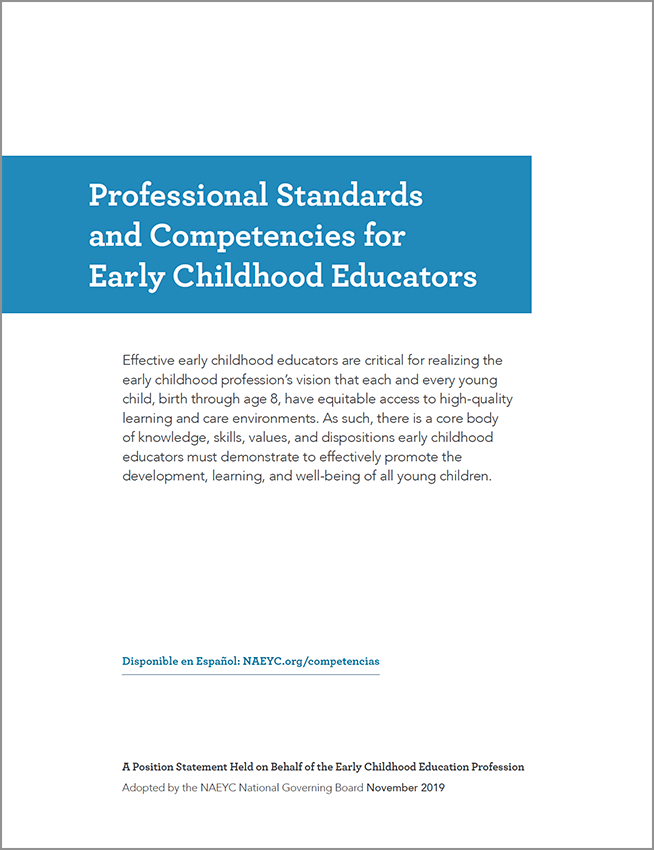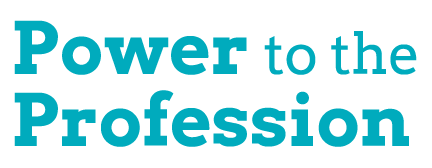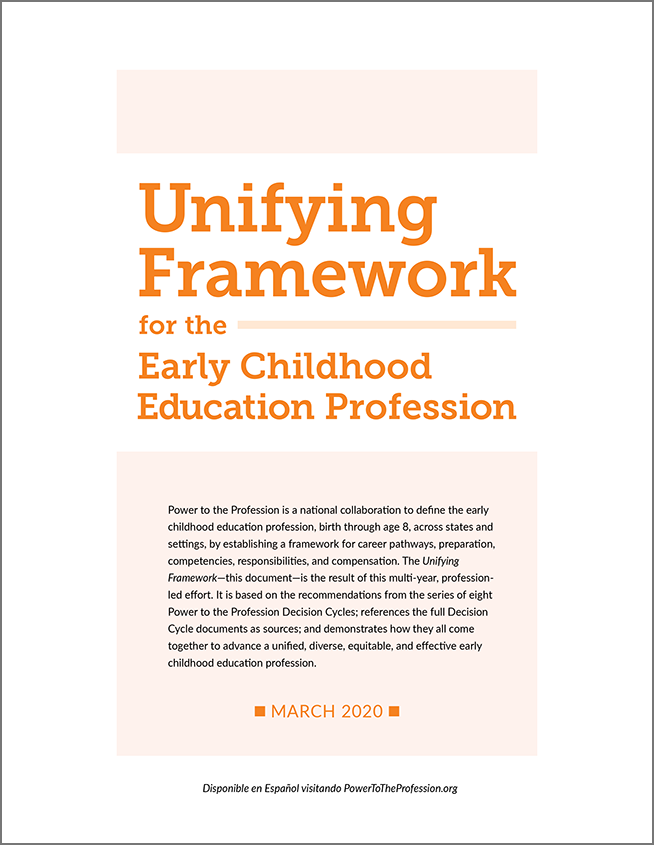Launching the
Unifying FrameworkThe Unifying Framework reflects unprecedented consensus by educators across states and settings, administrators, employers, and higher education, incorporates the recommendations from all eight decision cycles, including those related to educator roles and responsibilities, aligned preparation and pathways, professional compensation, and a supportive infrastructure with shared accountability. It also calls for significant increases in federal and state investments to help ensure the 40 million U.S. children, birth to age 8, are well-served by an effective, diverse, and fairly compensated workforce of professionals.
Inclusive Process
The three-year process of developing the Unifying Framework for the Early Childhood Profession has been led by a broad-based Task Force of 15 national early childhood organizations representing educators, administrators, employers, higher education faculty, and others.
The Task Force met regularly over 36 months, and reviewed and revised multiple drafts that were organized into eight “Decision Cycles.” The final Unifying Framework represents a consensus of all 15 groups.

Overview
Vision
Each and every child, beginning at birth, has the opportunity to benefit from high-quality early childhood education, delivered by an effective, diverse, well-prepared, and well-compensated workforce across all states and settings.
To achieve this vision, the Power to the Profession Task Force, in partnership with organizational stakeholders and thousands of individual educators, advocates, and allies, developed several primary recommendations to establish unity and clarity around the career pathways, knowledge and competencies, qualifications, standards, accountability, supports, and compensation to define the early childhood education profession within the broader early childhood education field.
Each of the policies and structures briefly outlined above and comprehensively described in the pages that follow, are designed to move us collectively toward the vision and goal at the heart of the Power to the Profession. It is time for significant and sustained public investments that will allow all children, birth through age 8, to benefit from high-quality early childhood education provided by well-prepared, diverse, supported, and compensated professionals. Let us move forward with this shared agenda that paves the way for a visionary future.
Three Professional Designations, with Distinct Roles and Responsibilities
The early childhood education profession will include three distinct and meaningful designations— Early Childhood Educator (ECE) I, Early Childhood Educator (ECE) II, and Early Childhood Educator (ECE) III. Although these professionals will be prepared to work together in various configurations as part of a teaching team, each designation has an associated scope of practice, expected level of professional preparation, and expected level of mastery of the Professional Standards and Competencies for Early Childhood Educators.
To recognize these levels of mastery, all early childhood educators will hold a professional license to practice at the ECE I, II, or III designation based on: completing an accredited/recognized professional preparation program, completing field experiences, and passing an assessment(s) of competencies. Licensure assessments must have multiple measures, be affordable, and not reinforce cultural, gender, racial, or linguistic biases, and educators must have affordable, equitable, efficient, and high-quality paths to licensure.
Aligned Professional Preparation Pathways and Specializations
Three primary professional preparation pathways—early childhood education certificate/credential programs, early childhood associate degree programs, and early childhood bachelor’s degree/ initial master’s degree programs—will prepare early childhood educators for licensure at the ECE I, II, and III designations, respectively. At each of these designations, early childhood educators must have a general early childhood education foundation before specializing. Professional preparation programs are encouraged to collaborate with professional organizations, which will be responsible for developing, administering, and issuing specializations, and to create high-quality and accelerated pathways to those specializations, such as blended programs. Other qualifying professional preparation programs, particularly non-degree-awarding programs or programs in freestanding institutions, will also be incorporated.
Professional Compensation
As early childhood educators are professionally prepared, so must they be professionally compensated. Compensation for early childhood educators will be comparable for those with comparable qualifications, experience, and job responsibilities, regardless of whether they work in a community-based center, elementary school, or family-based child care home. Compensation will include an adequate benefits package, increase commensurate with increased preparation and increased competency, and not be differentiated on the basis of the ages of children served. Public n 2 n
school salaries will serve as the minimum benchmark for comparable compensation, assuming comparable qualifications, experience, and job responsibilities.
Supportive Infrastructure and Shared Accountability
Professional preparation programs. As public funding is increased and the necessary infrastructure is built, professional preparation programs will be held accountable for supporting the early childhood education profession to provide high-quality care and education across all states and settings, by earning accreditation or recognition, ensuring graduates are proficient in the Professional Standards and Competencies, and providing seamless pathways so that individuals may advance their preparation and role in the profession.
Employers/Owners. Within the context of recognizing the additional supports that owners and operators of family child care in particular will need to meet expectations, as public funding is increased and the necessary infrastructure is built, employers/owners will be accountable for providing comparable compensation, benefits, and working conditions that promote the well-being, autonomy, and effectiveness of employees, and support the implementation of the profession’s standards.
Professional governance. An initial professional governance body (PGB) will immediately support implementation of the Unifying Framework and advance the long-term sustainability of the profession. The PGB will set the guidelines for the profession and ensure that a significant portion is comprised of individual early childhood educators, representing those who work in each setting, as well as public members who do not serve on behalf of organizations. The PGB will operate as a semi-autonomous body initially hosted by the National Association for the Education of Young Children, and subject to a comprehensive, substantial, and independent review within the first three years.
States. State governments and agencies will use increased and targeted funding, legislation, and smart regulation to advance these recommendations, particularly for members of the profession, professional preparation programs, and employers/owners. State governments and agencies will adopt the Professional Standards and Competencies, organize professional licensure, and adapt regulatory structures to support a professional workforce.
Federal government. The federal government will serve as the financing backbone for the early childhood education system, align regulations and legislation to the recommendations of the Unifying Framework, and protect and invest in early childhood education as a public good.
Both states and the federal government will engage with and be responsive to the public and to members of the profession and professional organizations (such as associations and unions) and address barriers to membership in such organizations.
Voices from the Field
“When you advocate, you have to have a plan and must obtain the research to support your funding request. The framework gives us the plan that we can all get behind.”
share your story
Share your story! Join the movement to advance the early childhood education profession by contributing to the Voices from the Field project.
Sources
Professional Standards & Competencies for Early Childhood Educators
The Professional Standards and Competencies for Early Childhood Educators describes what all early childhood educators must know and be able to do, and as articulated in the Unifying Framework, will serve as the foundational standards and competencies for the early childhood education profession. It places diversity and equity at the center and responds to the critical competencies identified in Transforming the Workforce for Children Birth Through Age 8: A Unifying Foundation, the seminal 2015 report by the Institute of Medicine and National Research Council.

"We're All In"
Over 11,000 early childhood educators contributed to the Power to the Profession decision cycle process. Together, early childhood educators across states and settings are saying “I’m in” to make the vision of the Unifying Framework a reality.
Are you in?
Task Force Members
early childhood educators engaged
Stakeholder Groups
Rounds of Public Comment
Keep in Touch
Implementing the recommendations of the Unifying Framework will take all of us.

